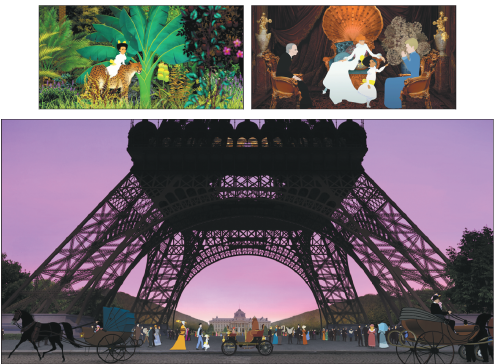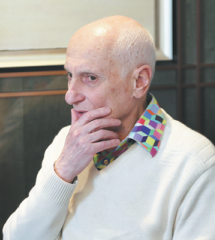Drawing from the past
By Xu Fan (China Daily) Updated: 2019-12-26 00:00A legend in the world of French cinematic animation, 76-year-old auteur Michel Ocelot recently visited China with his latest directorial outing, Dilili in Paris, winner of the best animated film at the 2019 Cesar Awards-the French equivalent of the Oscars.
The movie, which opened the Annecy Film Festival in 2018, was released in Chinese mainland theaters on Saturday.
Told from the perspective of a child, a method Ocelot often adopts, the story sees Dilili, a 6-year-old Kanak girl from New Caledonia-a French territory in the South Pacific-team up with a delivery boy to probe a string of mysterious child kidnappings in the French capital.
While the plot may sound a little flat to fans of the genre, the film should attract arthouse enthusiasts as it's something of a love letter to Paris during the Belle Epoque period-a famous artistic heyday for France between the late 19th and early 20th centuries.
During their investigations, the amateur detective duo meet more than 60 cultural figures and scientists of the time-from Nobel laureate Marie Curie to novelist Marcel Proust to biologist Louis Pasteur.
Of all the famous names in Paris, Emma Calve-the French operatic soprano famed for performing the lead in Georges Bizet's Carmen-plays a key role in helping Dilili and delivery boy Orel on their mission.
"I chose the year 1900 as the set for my film, as I believe it was a beautiful era that saw many of the world's finest and most talented artists and scientists gather in Paris. Despite having all passed away, their legacy will benefit humankind now and forever," Ocelot told China Daily during a recent visit to Beijing.
But there were characteristics of the era that Ocelot-who defines himself as a "global citizen"-feels uneasy and regretful about, realizing that Europe at that time only acknowledged the achievements made by white people.
With his childhood memories of family life in the West African country of Guinea and his knowledge of literature, the director developed the character of Dilili, a mixed-race child not regarded as "one of us" either by the Africans or the Europeans depicted in the film.
"It's not just about racial identity. I want to explore the diversity of culture. In some senses, I am like a child with a sweet tooth, who wants to taste candy from every corner of the world," the animator says.
The animation also features a two-dimensional hand-drawn style, set against the photorealistic backdrops of landmark attractions in Paris, from the Moulin Rouge to Le Bateau-Lavoir.
Ocelot reveals that all the backdrops were digitally transformed from photographs of the iconic buildings, as he believed there was no need to redraw the breathtaking Parisian landscapes already familiar to audiences around the world.
But behind the picturesque scenery, the ugly truths uncovered by the duo are as dark as they are terrible.
Under the control of an insane misogynist, the kidnappers abduct young girls from the streets of Paris and train them to become so-called "crawling people", who are forced to walk on all fours and serve as "benches" for men to sit on and rest.
This rather exaggerated metaphor refers to the struggle by women for gender equality over the centuries. Ocelot says he believes it is utterly wrong to consider women as "inferior to men".
"Although I am fascinated by glittering and enduring civilizations and cultures, I'm scared by the dark chapters of history and the malice shown toward women. We would be much happier if men and women were treated equally," he says.
As the former president of the International Animated Film Association, Ocelot says he has long held a strong interest in Chinese animation, especially Shanghai Animation Film Studio's classics, such as Three Monsters and Little Tadpoles in Search of Their Mother.
Chinese culture has also become his new source of artistic inspiration, reveals the director, who is planning to make the 15-minute animated flick, A Dream Lover, inspired by his visit to see the ancient architecture in Hangzhou, capital of Zhejiang province, a few years ago.
"The Chinese story will be about the daughter of a pharmacy owner," reveals Ocelot.
The meticulous filmmaker usually spends six years producing a film. But Ocelot intends to produce his upcoming works-which will include a feature-length anthology of three short tales set in Egypt and France-more quickly.
Born in Villefranche-sur-Mer in 1943, the artist who has been devoted to animation for over half a century jokingly suggests his passion developed in the mid-1940s at the age of 18 months.
"I always liked to scribble on paper or anything else that was available. There were no TV sets in my childhood, so I had to create my own amusement. Thanks to painting and animation, they continue to make me happy and have now become part of my life," says an emotional Ocelot.


- 'Cooperation is complementary'
- Worldwide manhunt nets 50th fugitive
- China-Japan meet seeks cooperation
- Agency ensuring natural gas supply
- Global manhunt sees China catch its 50th fugitive
- Call for 'Red Boat Spirit' a noble goal, official says
- China 'open to world' of foreign talent
- Free trade studies agreed on as Li meets with Canadian PM Trudeau
- Emojis on austerity rules from top anti-graft authority go viral
- Xi: All aboard internet express











